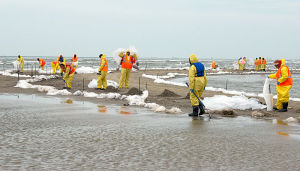Government Grants
Business Grants
Home Owner Programs
Federal Programs
About Us
NOAA Climate Program Office FY2017 - Understanding Climate Impacts on Fish Stocks and Fisheries to Inform Sustainable Management
Healthy and productive fisheries are an essential component of the U. S. economy.
There is increasing concern about the impacts of climate variability and change on fish stocks, fisheries, and marine ecosystems in the U. S. Climate variability and change influences many parameters (e.g.
extreme events, winds, ocean temperatures, stratification, currents, coastal precipitation, inundation, etc.) that directly and indirectly affect marine ecosystem conditions including the abundance, distribution, and productivity of fish stocks that support economically important fisheries.
Sustainable fisheries management in a changing climate requires an improved understanding of how climate, fishing, and other stressors interact to affect fish stocks (including their habitats and prey), fisheries and fishing-dependent communities.
To address these issues of growing concern, in 2014 the Office of Atmospheric Research (OAR) Climate Program Office and the National Marine Fisheries Service (NMFS) Office of Science and Technology launched a new partnership to advance understanding of climate-related impacts on fish or other species that support economically important fisheries and fishing communities.
The goal is to inform sustainable fisheries management and promote resilience of the nation’s fish stocks and fisheries in a changing climate.
For FY17, this OAR/NMFS partnership, through the Coastal and Ocean Climate Applications (COCA) Program, will continue to take a regional approach to improving the resilience and adaptation of fisheries in a changing climate by soliciting proposals under two competitions.
The first competition solicits proposals for projects in the California Current Large Marine Ecosystem (CCLME) and the second competition solicits proposals for projects in the Northeast US Continental Shelf Large Marine Ecosystem (NESLME).
There is increasing concern about the impacts of climate variability and change on fish stocks, fisheries, and marine ecosystems in the U. S. Climate variability and change influences many parameters (e.g.
extreme events, winds, ocean temperatures, stratification, currents, coastal precipitation, inundation, etc.) that directly and indirectly affect marine ecosystem conditions including the abundance, distribution, and productivity of fish stocks that support economically important fisheries.
Sustainable fisheries management in a changing climate requires an improved understanding of how climate, fishing, and other stressors interact to affect fish stocks (including their habitats and prey), fisheries and fishing-dependent communities.
To address these issues of growing concern, in 2014 the Office of Atmospheric Research (OAR) Climate Program Office and the National Marine Fisheries Service (NMFS) Office of Science and Technology launched a new partnership to advance understanding of climate-related impacts on fish or other species that support economically important fisheries and fishing communities.
The goal is to inform sustainable fisheries management and promote resilience of the nation’s fish stocks and fisheries in a changing climate.
For FY17, this OAR/NMFS partnership, through the Coastal and Ocean Climate Applications (COCA) Program, will continue to take a regional approach to improving the resilience and adaptation of fisheries in a changing climate by soliciting proposals under two competitions.
The first competition solicits proposals for projects in the California Current Large Marine Ecosystem (CCLME) and the second competition solicits proposals for projects in the Northeast US Continental Shelf Large Marine Ecosystem (NESLME).
Obtain Full Opportunity Text:
Not Available
Additional Information of Eligibility:
Eligible applicants are institutions of higher education, other nonprofits, commercial organizations, international organizations, and state, local and Indian tribal governments.
Full Opportunity Web Address:
Contact:
Competition Manager: Adrienne Antoine (Adrienne.Antoine@noaa.gov) Special Projects Manager: Sarah Close (Sarah.Close@noaa.gov)
Agency Email Description:
Work
Agency Email:
Adrienne.Antoine@noaa.gov
Date Posted:
2016-10-20
Application Due Date:
2017-01-23
Archive Date:
2017-02-22
Social Entrepreneurship
Spotlight
When it Comes to Social Enterprises, Failure is the Best Platform for Innovation

In the world of social enterprises, failure is a cringe-worthy moment nobody wants to talk about. But, social entrepreneurs can benefit from their failures.

